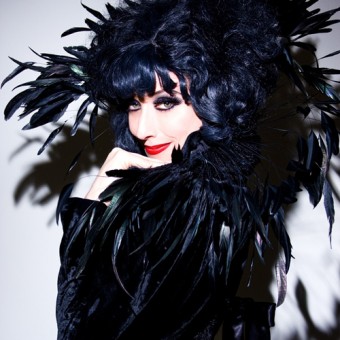Welcome back to our song-by-song commentary on Get Happy, written by our always affable band leader Thomas M. Lauderdale. In this installment, Thomas dives into the history of the well-known “Quizás, quizás, quizás” and the jazzy “I’m waiting for you to come back”. Enjoy!
TRACK 2: “Quizás, quizás, quizás”

Two and a half years ago there was a big crisis in the band. China lost her voice. She was ordered by her doctors to keep silent and she was told she needed to have surgery on her vocal cords. This was a nightmare because Pink Martini had a full calendar. Without China, we thought we might be finished. I called my friend Storm Large, who I’d known for several years. Storm is from Massachusetts, spent a decade in San Francisco, was on the reality TV show Rock Star Supernova, moved to Portland, and had a band that was big and brassy and outrageous. I had admired Storm because she is smart, and very political. We had bonded around politics and become friends through our political work through the years. When China’s vocal crisis surfaced, I had the gut instinct to call Storm and ask her if she would consider performing with us. We had four sold-out concerts at the Kennedy Center with the National Symphony that coming weekend. Unbelievably, she said yes. She had never sung in a foreign language, but remarkably, she learned ten songs in five languages in four days. It was totally nerve-wracking. But it taught all of us that the band could go on without China. So in a way, Storm saved the band.
Once China Forbes made full recovery, it made a lot of sense to keep working with Storm Large as well. China’s a mother. Her son Cameron is on the cover of this record. With motherhood comes a different set of priorities, and so now the two divide the time performing with the band. It’s an ideal solution for everyone.
“Quizás, quizás, quizás” marks the recording debut of Storm Large with Pink Martini. It’s totally different from anything else she’s ever recorded. I believe people will finally understand what a spectacular voice Storm has. I think people can get distracted by the physicality of Storm when she is performing because she’s larger than life and exudes sensuality. Not having that visual distraction and just hearing the sound of her voice on this record is going to be revelatory: people are going to truly understand what a fantastic singer she really is.
“Quizás, quizás, quizás” has been recorded hundreds of times by all kinds of artists. Nat King Cole did a Spanish(-ish) recording of it. Doris Day, Cake, Jennifer Lopez, Los Panchos, and Henri Salvador all have recorded the song. It was written in 1947 in Cuba by Osvaldo Farrés. I’ve always loved the slow, sexy, languorous version by Maysa Matarazzo, the Brazilian singer. We drew a lot of inspiration from Maysa’s version; it is just very patient.
On this album more than any of the others that we have recorded, I really danced my way through the recording process. It was always about how it felt in the body. The rhythm section would lay it down with the singer and with the bass, the piano, and the percussion and it would all go together. Listening back the question was always, “How does it feel in the body?” If it was too fast then it felt kind of terrible. In that sense there’s a lot of ballet in this album. More so than any other album you can feel the way I actually dance.
This version of “Quizás, quizás, quizás” is really slow and patient and unfolds in a hopefully glorious way. I think this is the most beautiful recording of the song ever, but I am a little biased. The thing about recording a song that has been recorded as often as “Quizás, quizás, quizás” is that it should be better than anybody else’s, otherwise you shouldn’t do it. Hopefully we’ve achieved that.
TRACK 3: “I’M WAITING FOR YOU TO COME BACK”

The third song on “Get Happy” is “I’m waiting for you to come back”, 等着你回來, based on a version sung by the great singer/actress Bai Guang in 1947 in Mandarin. My junior year college roommate was Andrew Jones, who now is professor of East Asian Languages and Studies at Berkeley in California. He, like me, was a Hello Kitty fanatic; and even then was obsessed with Chinese pop culture of the twentieth century. Since then, he has written several ground-breaking books about Chinese pop culture. But back in 1991 we were roommates and he made me a mix tape documenting the history of Chinese popular music in the 20th century. We previously recorded one of those songs — “Congratulations” (A Chinese New Year song) — for our holiday album Joy to the World.
“I’m Waiting for You to Come Back” was also on that mixed tape. I have always loved this song, and its intersection of 1930s American jazz and Hollywood with Shanghai. On our album it is sung by the fantastic cabaret sensation Meow Meow. I was hired to be Meow Meow’s pianist about eight years ago when Portland Institute for Contemporary Art brought her to town for its annual Time-Based Art Festival. We have been collaborating ever since. In fact, Meow Meow and I recently performed in Portland with the Oregon Symphony. It was without a doubt the wildest night the Oregon Symphony has ever seen. She crowd-surfs. She climbs all over people. Meow Meow’s shows are somewhere between Cirque du Soleil (but smarter and with better music), Edith Piaf and Marlene Dietrich concerts and performance art/ballet and punk rock. She’s extraordinary. We have the same sort of aesthetic. She’s fluent in German, she’s fluent in French, and English for the most part. It’s hard to know where exactly she’s from. There was a revival last year of The Umbrellas of Cherbourg on the West End in London. Michel Legrand loved her so much that he wrote a new part for her for that production. Meow Meow was the only one who got the good reviews. The rest of the production was totally slammed. It was in English, can you imagine???
Anyway, Meow Meow and I have been working on an album for several years, and it will include several songs that we’ve written together. Though we didn’t write this one, we couldn’t resist recording this incredible song in Mandarin “I’m waiting for you to come back.”
Come back in two weeks for the stories behind “Omide zendegani” and “Yo te quiero siempre”!